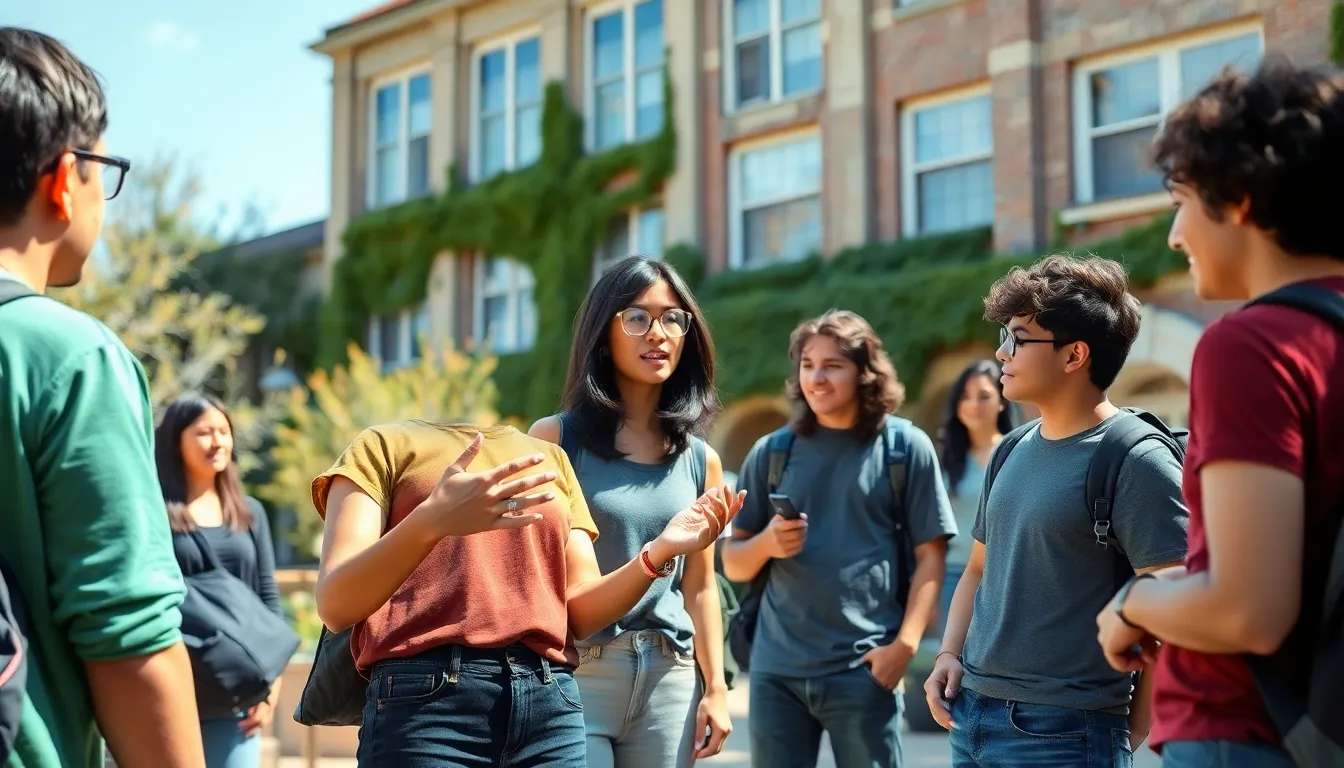Table of Contents
ToggleNavigating the world of higher education can feel like trying to solve a Rubik’s Cube blindfolded, especially for those with unique learning needs. Special education colleges are like the GPS for this tricky journey, guiding students toward success with tailored programs and supportive environments. They’re not just about academics; they’re about unlocking potential and celebrating individuality in a fun and engaging way.
Overview of Special Education Colleges
Special education colleges play a crucial role in facilitating higher education opportunities for students with unique learning needs. These institutions provide customized programs designed to meet diverse learning requirements. Students benefit from tailored curricula that incorporate various teaching methods and learning strategies.
Programs within special education colleges emphasize both academic excellence and personal growth. Faculty members typically receive specialized training, enabling them to support individual learning styles effectively. Moreover, small class sizes foster an environment conducive to personalized attention, ensuring each student receives adequate support.
Support services offered at these colleges often include tutoring, counseling, and mentorship. Access to resources such as assistive technology enhances the educational experience. Collaboration with families and communities strengthens the support network around each student.
Special education colleges focus on fostering skills that encourage independence. Students engage in activities that promote self-advocacy and life skills development. Awareness of social integration remains a priority, enhancing peer relationships and building a sense of belonging.
Graduates from special education colleges often achieve remarkable success in various fields. Many continue their education at universities or pursue vocational training. Achievements of alumni highlight the importance of tailored educational paths in shaping future opportunities.
Understanding the significance of special education colleges deepens appreciation for the dedicated efforts to empower students with unique learning needs.
Programs Offered in Special Education Colleges

Special education colleges provide a variety of programs designed to support diverse learning needs. Each program focuses on equipping students with the skills to succeed in academic and social environments.
Bachelor’s Degree Programs
Bachelor’s degree programs in special education prepare graduates for teaching roles in inclusive classrooms. Course offerings typically include subjects like educational psychology, methodologies for teaching students with disabilities, and behavior management strategies. Field experiences enhance learning by allowing students to engage with diverse populations in real-world settings. Graduates become adept at creating customized lesson plans that cater to individual needs.
Master’s Degree Programs
Master’s degree programs focus on advanced strategies for supporting students with unique learning challenges. Studies often cover areas such as special education law, assessment techniques, and intervention strategies. These programs may include a thesis or capstone project, allowing students to apply knowledge in practical situations. Graduates frequently pursue leadership roles, advocating for policy changes that benefit students.
Certification Programs
Certification programs offer specialized training for those seeking to enhance their credentials in special education. Programs may cover autism spectrum disorders, learning disabilities, or emotional and behavioral disorders. Participants often receive practical training alongside theoretical knowledge, preparing them for various educational contexts. Certifications boost employment opportunities, enabling educators to effectively support diverse learning needs across settings.
Admission Requirements for Special Education Colleges
Admission requirements for special education colleges vary by institution but generally follow a few common criteria. These criteria ensure that students possess the foundation necessary for success in specialized programs.
Educational Background
An applicant’s educational background includes completed high school education, often with a focus on relevant coursework. Many colleges prefer candidates with experience in psychology, special education, or similar fields. Transcripts typically reflect strong academic performance, particularly in subjects that foster critical thinking and communication skills. Some colleges accept transfer students from other higher education institutions, provided they meet specific benchmarks. Additionally, candidates may be required to submit letters of recommendation that highlight their passion for supporting individuals with diverse learning needs.
Standardized Tests
Standardized tests may play a role in the admission process for some special education colleges. Many institutions require either the SAT or ACT as a component of their application. These tests measure general knowledge and help assess readiness for college-level coursework. Some colleges, however, employ a more holistic approach by considering alternatives to standardized testing. Nontraditional applicants may demonstrate their skills through portfolios or interviews. This flexibility accommodates students with unique abilities, emphasizing the colleges’ commitment to inclusivity and support.
Career Opportunities After Graduating from Special Education Colleges
Graduates from special education colleges enjoy diverse career opportunities that align with their specialized training. These programs prepare individuals to make significant contributions in various roles.
Teaching Positions
Teaching positions are common for graduates. Many secure roles as special education teachers in public or private schools. They create inclusive classrooms that accommodate students with unique learning needs. Educators are trained in instructional strategies and adapt lesson plans accordingly. With a Bachelor’s or Master’s degree, individuals enhance their prospects for specialized teaching positions. Certification in specific areas, such as autism spectrum disorders, further increases employability. The demand for qualified teachers continues to rise, ensuring numerous opportunities in the field.
Administrative Roles
Administrative roles also attract special education graduates. Many transition into positions such as special education coordinators or program directors. These professionals oversee the implementation of educational programs designed for students with special needs. They collaborate with teachers, parents, and other stakeholders to ensure effective strategies. Strong organizational skills and knowledge of educational laws benefit those in administrative positions. Additionally, networking and continuing education play vital roles in career advancement within educational administration.
Support Services
Support services offer another pathway for graduates. Many individuals find rewarding roles as counselors, advocates, or case managers. These professionals provide guidance and resources to students and families navigating educational challenges. They assist in developing Individualized Education Programs (IEPs) and ensure compliance with regulations. Community organizations and schools often seek qualified individuals for these positions. Working in support services creates opportunities for meaningful impact in students’ lives, fostering their growth and success in educational settings.
Special education colleges are vital in shaping the futures of students with unique learning needs. By offering tailored programs and a supportive environment, these institutions empower students to thrive both academically and personally. The focus on individualized learning and skill development fosters independence and self-advocacy, preparing graduates for a range of career opportunities.
As more students pursue education through these specialized colleges, the impact on their lives and communities becomes increasingly significant. The commitment to inclusivity and personalized support not only enhances educational experiences but also contributes to a more equitable society. The journey through special education college is not just about achieving academic success; it’s about unlocking potential and celebrating each student’s unique journey.




